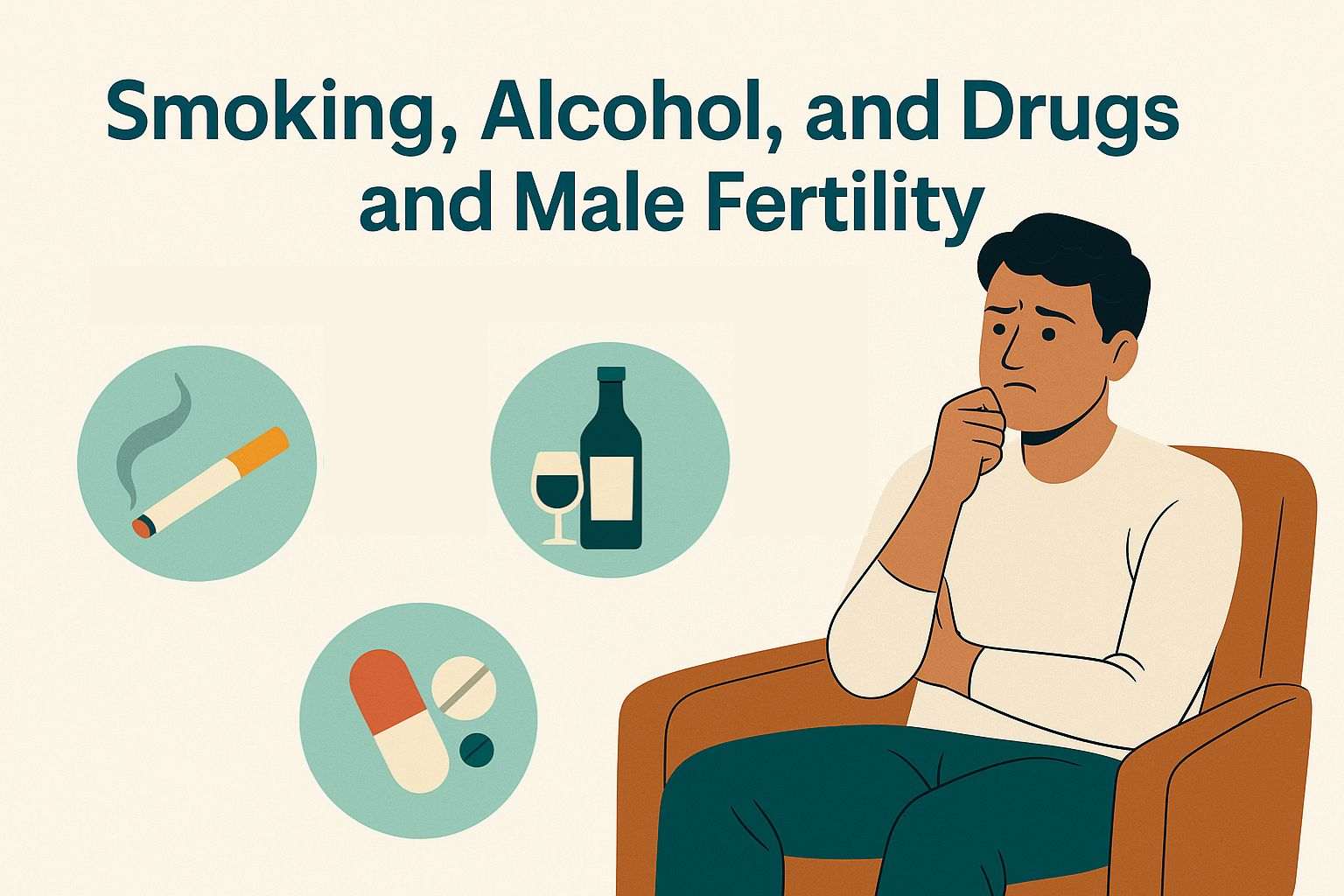The lifestyle choices directly impact the ability to conceive. While male fertility naturally declines with age, certain habits accelerate this process considerably. Recent research shows alarming connections between substance use and reproductive health, with studies showing that men who smoke, drink heavily, or use drugs face reduced sperm counts, decreased motility, and higher DNA damage in their sperm cells. Men planning to start a family need to understand how smoking affects sperm quality and overall reproductive health.
Let’s find out how these lifestyle factors damage male reproductive health and what steps you can take to protect your fertility.
The hidden impact of cigarettes on male reproduction
Smoking and fertility share an inverse combination that becomes more damaging with each cigarette. According to multiple fertility studies, men who smoke regularly produce 23% fewer sperm than non-smokers. The toxic chemicals in tobacco, including nicotine, tar, and carbon monoxide, create oxidative stress that damages sperm DNA and reduces overall sperm quality. Research clearly shows how smoking affects sperm production at the cellular level.
The tobacco effects on men’s fertility are higher. Cigarette smoke contains over 4,000 chemicals, the majority of which are known reproductive toxins. These substances interfere with hormone production, reduce testosterone levels, and impair the development of healthy sperm.
Here’s the answer to how does smoking damage sperm:
- Reduces sperm concentration by up to 25%
- Damages sperm DNA through oxidative stress
- Decreases sperm motility and swimming ability
- Alters sperm shape and morphology
- Lowers testosterone production
Men trying to conceive should consider that sperm development takes approximately 74 days. It means the effects of quitting smoking may take several months to show improvement.
Alcohol’s complex effect on sperm health
Does alcohol affect sperm? This is a question many men ask, and the answer depends mainly on consumption patterns. Moderate alcohol consumption may not severely impact fertility, but regular heavy drinking creates serious reproductive problems.
Research shows that alcohol and sperm have a complicated bonding where excessive consumption leads to hormonal imbalances and reduced sperm quality. Therefore, the query “Does drinking alcohol reduce sperm count?” becomes clear in studies examining heavy drinkers. Men consuming more than 14 units of alcohol per week show less sperm concentration and higher numbers of abnormally shaped sperm. Chronic heavy drinking is one of the key contributors to a low sperm count and reduced fertility in men. Alcohol disturbs hormone production, which is important for sperm development.
Ethanol and its metabolite acetaldehyde directly damage sperm cells, while chronic alcohol consumption reduces zinc levels, a mineral important for healthy sperm function. Heavy drinking can lead to liver dysfunction, which affects the body’s ability to metabolise hormones properly. Hence, this is how alcohol affects sperm.
Recreational drugs and their devastating effects on fertility
The effects of drugs on sperm count differ based on the substance, but most recreational drugs negatively impact male fertility. Cannabis, cocaine, and anabolic steroids all interfere with normal sperm production and function. Marijuana use, even occasional, can reduce sperm concentration by up to 29% and affect sperm’s ability to swim properly.
Cocaine use damages sperm DNA and reduces overall sperm motility. The drug’s vasoconstricting properties also reduce blood flow to the testes, impairing sperm production. Anabolic steroids suppress natural testosterone production and can cause temporary or permanent infertility. It clearly shows that drugs affect sperm quality in multiple ways.
These things overall contribute to the male infertility causes to a greater extent.
Recovery and hope: Reversing the damage
The encouraging news is that many fertility problems caused by substance use are reversible. Sperm production is continuous, and healthier lifestyle choices can lead to improved fertility within three to four months. Research shows that ejaculation frequency affects sperm quality and overall count. Men who quit smoking show gradual improvements in sperm count and motility, while reducing alcohol consumption can restore hormonal balance.
Recovery requires commitment and often professional support. Smoking and fertility recovery show improvements within 2-3 months, while alcohol-related fertility issues may resolve more quickly with reduced consumption. During recovery, maintaining good nutrition, regular exercise, and stress management supports good sperm production.
Making the change for your future family
Men with fertility issues are usually distressed by the changes required to improve their reproductive health; however, every positive step matters. Even cutting the number of cigarettes smoked, cutting alcohol intake, or dropping recreational drug use can help. However, professional fertility testing can help in monitoring reproductive status accurately.
Regular semen analysis gives objective information regarding the sperm count, their motility, and morphology, which helps in treatment decisions and lifestyle changes. The journey to fatherhood might be toughest for you, but the happiness of conceiving naturally makes these sacrifices valuable. Reach out to The Male Fertility Clinic and get the best fertility testing from the professionals.


